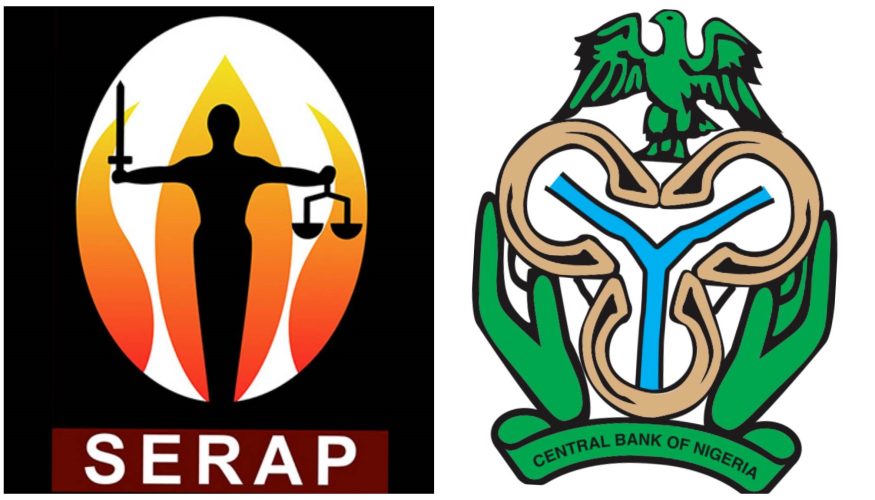SERAP Charges CBN to Court Over Plans to Collect Customers Social Media Handles
- Posted on July 24, 2023
- Finance
- By PETER AGADA

The Socio-Economic Rights and Accountability Project (SERAP) has asked the Federal High Court in Lagos to order the Central Bank of Nigeria (CBN) to remove its direction to banks and other financial institutions requesting information from customers' social media accounts for identification.
In the suit, which has yet to be assigned to a judge, SERAP asked the court for a mandamus order compelling the CBN to remove the illegal rules of Section 6 of its customer due diligence regulations, 2023 for not following up with Section 39 of the Nigerian Constitution 1999 (as amended) and Article 9 of the African Charter on Human and Peoples' Rights.
The applicant claimed in an affidavit filed in support of the legal action that the required demand of users' social media names or addresses serves no legal purpose and that such information may restrict their expression and privacy.
SERAP further claimed that unless the requested reliefs are granted, the CBN would adopt and enforce the illegal directive, violating the rights of citizens to free expression and privacy.
It also claims that the extra need of acquiring a customer's social network handle or address "fails to meet the legality, necessity, and proportionality requirements."
The applicant also argued that since there are sufficient means of identification for the CBN, banks, and other financial institutions to rely on to meet the KYC requirement raises concerns about overreach and grants banks and financial institutions broad discretion.
It was argued that gathering information on clients' social media handles or addresses for identification purposes is more invasive than required.
According to Section 6(a)(iv) of the CBN Regulations, banks and other financial institutions "shall identify their customer and obtain information on the social media handle of the customer." Similar provisions can be found in Section 6(b)(iii).
It said that the law would prevent Nigerians from freely expressing their human rights online and that if the information was collected, it may be exploited for political and other illegal reasons.
THE OFFICIAL STATEMENT FROM SERAP CONCERNING CBN DIRECTIVES TO BANK TO COLLECT CUSTOMERS SOCIAL MEDIA HANDLES
“The CBN Regulations and directive to banks and other financial institutions would impermissibly restrict the constitutional and international rights to freedom of expression, privacy and victims’ right to justice and effective remedies.
“Requiring social media handles or addresses of customers as a means of identification would have a disproportionate chilling effect on the effective enjoyment by Nigerians of their rights to freedom of expression and privacy online.
“The necessity requirement implies an assessment of the proportionality of the ground to ensure that the excuse of ‘regulations on customer due diligence’ is not used as a pretext to unduly intrude upon the rights to freedom of expression and privacy.
“The CBN regulation does not demonstrate how the use of social media handle or address as a means of identification would improve banks and other financial institutions’ ability to implement and comply with the laws and regulations relating to customer due diligence.
“The directive by the CBN, which does not, in any event, carry the force of law, also fails to explain how social media handles or addresses can facilitate compliance with regulations relating to customer due diligence.
“Obtaining the details of customers’ social media handles or addresses would unduly interfere with the rights to freedom of expression and privacy. It would also be disproportionate to any purported legitimate aim the CBN seeks to achieve.
“The cumulative effect of any attempt to access details of customers’ social media handles or addresses would be to undermine the letter, substance, and spirit of the rights to freedom of expression and privacy of Nigerians.
“The effective enjoyment of these fundamental rights constitutes a fundamental pillar for building a democratic society and strengthening democracy.
“The positive obligations of Nigeria to ensure the rights to freedom of expression and privacy will only be fully discharged if individuals are protected against violations by institutions like the CBN.
“The Nigerian Constitution guarantees in Section 39 the right to freedom of expression and in Section 37, the right to privacy.
“Article 19 of the International Covenant on Civil and Political Rights and Article 9 of the African Charter on Human and Peoples’ Rights also guarantee the right to freedom of expression. Article 17 of the Covenant also guarantees the right to privacy.
“In particular, Article 19(1) of the Covenant establishes the right to freedom of opinion without interference. Article 19(2) establishes Nigeria’s obligations to respect and ensure ‘the right to freedom of expression,’ which includes the freedom to seek, receive and impart information and ideas of all kinds, regardless of frontiers.
“Under article 19(3), restrictions on the right to freedom of expression must be ‘provided by law’, and necessary ‘for respect of the rights or reputations of others or ‘for the protection of national security or public order (ordre public), or public health and morals.
“The principles of legality, necessity, and proportionality apply to the right to privacy in the same manner as they do to freedom of expression and other fundamental freedoms.
“Restrictions to the rights to freedom of expression and privacy that do not comply with the elements of legality, legitimate purpose, and necessity and proportionality shall be deemed unlawful,” SERAP stated.


Be the first to comment!
You must login to comment